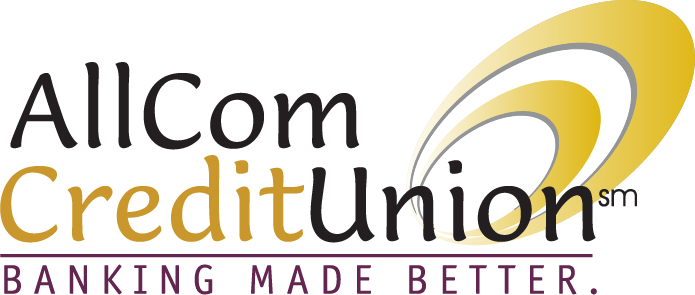Basic
If I leave my current employment, do I need to close my AllCom Account?
NO!! Once a member of the credit union, you are always a member of the credit union, regardless of where you work or live.
How often do your Savings and Loan Rates change?
Our Savings and Loan rates are analyzed on an ongoing basis. We conduct weekly rate surveys of other financial institutions to ensure that our rates remain competitive. When rates do change, our web site, 24/7 Connexion (audio) and lobby board are updated accordingly.
Do you offer online banking?
Yes! Members can enroll in our online banking service for free. Our online account access service enables members to access their accounts 24 hours a day, 7 days a week!
In addition, members can also enroll for CUe-statements a progressive method of receiving statements along with the capability to review statements up to 12 months old.
Overdraft Privilege
How have members received the ATM/Debit Card Consent Form?
AllCom Credit Union recently sent a mailing to our members that provided a letter explaining the changes and the consent form.
view the Consent Form
If a member’s Overdraft Privilege is suspended, can they get it back?
Yes. We review eligible checking accounts and reinstate Overdraft Privilege if qualified. If the member has already signed the ATM/Debit Card Consent Form, those transaction types will be available for Overdraft Privilege.
If a member’s Overdraft Privilege is removed, are all transactions included?
Yes, Overdraft Privilege will be removed for all transactions.
If a member signs the ATM/Debit Card Consent Form, does that imply that they will have Overdraft Privilege on their account?
No, all accounts will be reviewed periodically for eligibility as listed in the Overdraft Privilege Disclosure. If/when the Overdraft Privilege is activated a letter will be sent notifying the member that the privilege is now available to them.
view the Consent Form
If a member does not sign the form, will they have any Overdraft Privilege?
Yes, if the member meets the eligibility criteria and chooses not to sign the ATM/Debit Card Consent form the member will still have overdraft privileges on checks written, ACH transactions, recurring debit card transactions, internet banking and telephone banking. They will not, however, be able to use their debit card to utilize Overdraft Privilege and instead if the available balance is not sufficient, their debit card transaction will be denied.
If a member signs the ATM/Debit Card Consent Form, can they later decide to revoke their choice?
Yes, members may revoke or opt-out of authorizing overdrafts on ATM and debit cards at any time. The member will still have Overdraft Privilege for other transaction access channels unless they choose to opt-out of the entire Overdraft Privilege Program. If a member that currently has Overdraft Privilege would like to opt-out of the program entirely, they may do so by downloading the ODP Opt-Out Form found here:
Download the FormWhat if a member comes into the branch and states that they have forgotten to bring the consent form but they wish to opt-in?
We will provide members with another opt-in form to sign.
Can a member phone their authorization in to us?
Yes. Please call 508.754.9980 and ask to speak with Jennifer Lachambre, Carol Esparza or Laura Cummings.
How will members provide their consent?
Members may provide us with their authorization by:
- Returning the response form that is provided with the mailing;
- Contacting us via Telephone – when calling for the purpose of Opting-In, you may speak with Jennifer Lachambre, Carol Esparza or Laura Cummings
- Beginning on/around July 1, 2010, members will be able to provide their consent via AllBranch, AllCom’s Home Banking product. AllBranch members will be notified as soon as this feature becomes available.
What is Overdraft Privilege (ODP)?
Overdraft Privilege is a discretionary overdraft payment service that we provide to the majority of our members who have a checking account. As long as a member keeps their checking account in good standing we grant them the Privilege. If they do not manage their account responsibly we suspend or remove their Privilege. Members must meet the qualification criteria as described in the Overdraft Privilege Disclosure.
What transactions are included in ATM transactions?
ATM and not just cash withdrawals would be included. Some examples are: account-to-account transfer, postage stamp purchase, loan payments.
What is the difference between an one-time debit card transaction and a recurring debit card transaction?
Recurring debit card transactions are created when a debit card holder uses their card to initiate a monthly recurring payment instead of using a credit card. The debit card information is recorded once and the organization or vendor then submits the monthly bill to the financial institution with the debit card holder’s account number. These transactions have a code identifying them as recurring.
One-time or everyday debit card transactions occur when the account-holder uses their debit card at the time of purchase, such as, gasoline, groceries, movies, dinner, etc.
Why do we require our members to sign an ATM/Debit Card Consent Form?
On November 12, 2009, the Federal Reserve Board published changes to Regulation E (Electronic Fund Transfers). Under the rule, financial institutions may not charge members a fee for paying ATM and one-time debit card transactions unless the member affirmatively consents, or opts in to overdraft coverage for these transactions. The new rule does not apply to checks, ACH debits and recurring debit transactions creating overdrafts.
view the Consent Form
How can our members access Overdraft Privilege?
Overdraft Privilege can be accessed via:
- Checks Written
- ACH Transactions
- AllBranch Internet Banking
- AllCom Connexion Telephone Banking
- ATM Withdrawals*
- Debit Card / POS Transactions*
NOTE: *Requires the member to authorize the Credit Union by completing an ATM/DebitCard Consent Form.
How does a member know when they have Overdraft Privilege and what their limit is?
When a member initially qualifies for ODP we send them a welcome letter referred to internally as the Activation Letter. The Activation Letter briefly describes the benefits of the privilege and informs them that their account is now qualified. Also included with the Activation Letter is our Overdraft Privilege Disclosure (lists all of the terms and conditions) and a consent form for ATM and everyday debit card transactions (beginning July 1, 2010).
How can members apply for this benefit?
There is no application process. Members are provided this service automatically on checks written, ACH transactions, preauthorized automatic transfers, internet banking, and telephone banking when they meet the eligibility requirements explained in the Overdraft Privilege account disclosure.
Effective July 1, 2010, (August 15th for existing accounts) members must sign a consent form to authorize Overdraft Privilege on ATM and one-time debit card transactions.
If a member does not have ODP, they have either opted out or been suspended or excluded for not meeting the minimum requirements.
How does it work? How much does it cost a member?
We will generally pay items presented, up to the total of the Overdraft Privilege limit for each account. In addition to the items paid, our normal overdraft or return item fee of $25 will be added on a per item basis, and is included in the limit. For example, if we pay two overdraft transactions for a member, they would be charged two overdraft fees totalling $50. The member is not charged any additional amount per transaction for having this service on their account.
Overdraft Privilege does not cost a member anything unless they use it!

